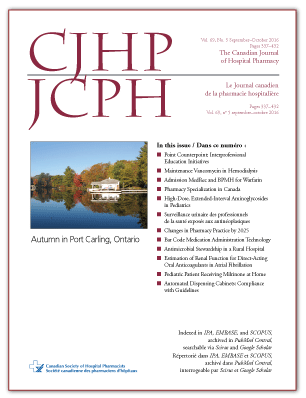Need for Formal Specialization in Pharmacy in Canada: A Survey of Hospital Pharmacists
DOI:
https://doi.org/10.4212/cjhp.v69i5.1590Keywords:
survey, hospital pharmacy specialization, certification, sondage, pharmacie hospitalière, specializationAbstract
ABSTRACT
Background: The Blueprint for Pharmacy was a collaborative initiative involving all of the major pharmacy associations in Canada. It aimed to coordinate, facilitate, and be a catalyst for changes required to align pharmacy practice with the health care needs of Canadians. In partial fulfilment of this mandate, a needs assessment for specialist certification for pharmacists was conducted.
Objective: To conduct a secondary analysis of data from the needs assessment to determine the perceptions of hospital pharmacists regarding a formal certification process for pharmacist specialties in Canada.
Methods: A survey was developed in consultation with the Blueprint for Pharmacy Specialization Project Advisory Group and other key stakeholders. It was distributed electronically, in English and French, to Canadian pharmacists identified through national and provincial pharmacy organizations (survey period January 15 to February 12, 2015). Data for hospital pharmacists were extracted for this secondary analysis. Multivariable logistic regression analyses were conducted to characterize those respondents who supported the certification process and those intending to become certified if a Canadian process were introduced.
Results: A total of 640 responses were received from hospital pharmacists. Nearly 85% of the respondents (543/640 [84.8%]) supported a formal certification process for pharmacist specialization, and more than 70% (249/349 [71.3%]) indicated their intention to obtain specialty certification if a Canadian process were introduced. Respondents believed that the main barriers to developing such a system were lack of reimbursement models, the time required, and lack of public awareness of pharmacist specialties. They felt that the most important factors for an optimal certification process were a consistent definition of pharmacist specialty practice and consistent recognition of pharmacist specialty practice across Canada. Multiple regression analysis showed that female respondents were more likely to support a formal certification process (odds ratio [OR] 2.6, 95% confidence interval [CI] 1.2–5.7). Also, those who already specialized in pharmacotherapy were more likely to support mandatory certification (OR 2.6, 95% CI 1.1–6.1).
Conclusions: Hospital pharmacists who responded to this survey overwhelmingly supported certification for pharmacist specialization in Canada. Questions remain about the feasibility of establishing a pharmacist specialization system in Canada.
RÉSUMÉ
Contexte : Le Plan directeur pour la pharmacie était un projet collaboratif auquel participaient les plus importantes associations canadiennes de pharmacie. Il cherchait à coordonner, faciliter et catalyser les changements nécessaires pour harmoniser la pratique de la profession avec les besoins en soins de santé des Canadiens. Une évaluation des besoins pour un système de certification des pharmaciens spécialistes a été menée dans le cadre de ce projet.
Objectif : Réaliser une analyse secondaire des données recueillies lors de l’évaluation des besoins afin de cerner les opinions des pharmaciens d’hôpitaux en ce qui touche au mécanisme formel de certification pour les spécialités en pharmacie au Canada.
Méthodes :Un sondage a été mis au point en consultation avec le Groupe consultatif sur le projet de spécialisation en pharmacie, sous l’égide du Plan directeur pour la pharmacie, et d’autres parties prenantes clés. Le sondage a été transmis par voie électronique, en anglais et en français, aux pharmaciens canadiens grâce aux organismes de pharmacie provinciaux et nationaux (l’enquête a eu lieu du 15 janvier au 12 février 2015). Cette analyse secondaire a porté sur le sous-ensemble des données relatives aux pharmaciens d’hôpitaux. Des analyses de régression logistique multivaria - ble ont été réalisées afin d’offrir un portrait des répondants qui sont partisans d’un mécanisme de certification et de ceux qui ont signalé leur intention d’obtenir la certification si un processus canadien était mis en place.
Résultats : Au total, on a obtenu 640 réponses de pharmaciens d’hôpitaux. Près de 85 % des répondants (543/640 [84,8 %]) appuyaient un mécanisme formel de certification pour la spécialisation en pharmacie et plus de 70 % (249/349 [71,3 %]) ont indiqué leur intention d’obtenir une certification de spécialiste si un processus canadien était mis en place. Les répondants croyaient que les principaux obstacles au développement d’un tel système étaient l’absence de modèles de remboursement, le temps nécessaire et l’ignorance du public en matière de spécialités en pharmacie. Selon eux, un processus de certification optimal reposerait principalement sur une définition uniforme de la pratique spécialisée pour les pharmaciens et une reconnaissance systématique de la pratique spécialisée pour les pharmaciens partout au Canada. Une régression multiple a montré que les répondantes étaient plus enclines à appuyer un processus formel de certification (risque relatif approché [RRA] de 2,6, intervalle de confiance [IC] à 95 % de 1,2–5,7). De plus, les répondants déjà spécialisés en pharmacothérapie étaient plus susceptibles d’être partisans d’une certification obligatoire (RRA de 2,6, IC à 95 % de 1,1–6,1).
Conclusions : Les pharmaciens d’hôpitaux ayant répondu à ce sondage appuyaient presque tous un mécanisme de certification pour la spécialisation en pharmacie au Canada. Par contre, certaines questions demeurent à propos de la viabilité d’un système de spécialisation en pharmacie au Canada.
Downloads
Published
Issue
Section
License
Copyright © Canadian Society of Healthcare-Systems Pharmacy.
After publication of a manuscript in the CJHP, the authors of the manuscript must obtain written permission from the CSHP (publications@cshp.ca) before reproducing any text, figures, tables, or illustrations from the work in future works of their own. If a submitted manuscript is declined for publication in the CJHP, all said rights shall revert to the authors. Please note that any forms (e.g., preprinted orders and patient intake forms) used by a specific hospital or other health care facility and included as illustrative material with a manuscript are exempt from this copyright transfer. The CJHP will require a letter from the hospital or health care facility granting permission to publish the document(s).










